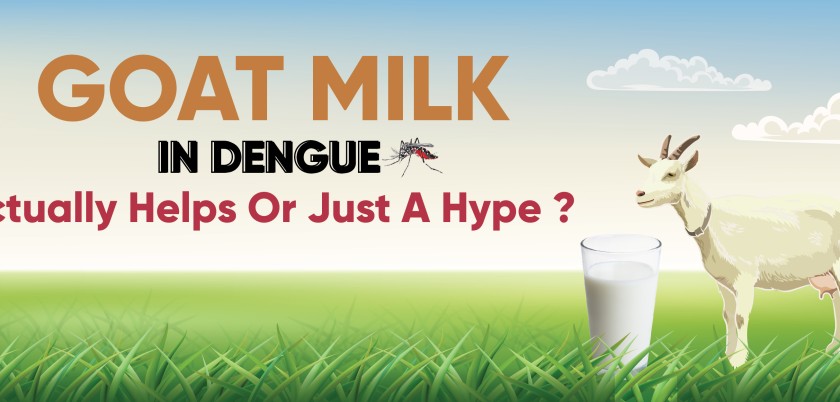
Goat milk in dengue- myth or reality?
Introduction -
Dengue is an acute viral infection transferred by the bite of Aedes mosquitoes to humans. Dengue fever is one of the main public health problem, annually affecting 50-100 millions of people, without any
effective treatment therapy available. WHO regards dengue as a global health threat. Symptoms of this fever are rashes, muscle and joint pain, red eyes and high body temperature. It is also known as ‘break bone fever’ as the joint pains following dengue are too severe to handle. Main biochemical effect of this fever is a significant decline in the
blood platelet count. Patients are advised to have adequate rest and eat small meals at frequent intervals.
Role of goat milk -
Various social media blogs claim that goat milk helps in curing the
dengue fever by significantly increasing the blood platelet count. Is
this true? There is no scientific evidence of goat milk raising the
blood platelet count. Dengue fever is followed by platelet reduction and
deficiency of selenium.
1. Selenium rich - Firstly, Goat milk, in comparison with all other milks available in the market, has 27 percent more selenium (13.7ng/mL). Selenium is an important mineral responsible for maintaining the immune system of the body. Selenoprotein acts as a potent antioxidant and prevents the oxidative damage in the body and helps in boosting the
immunity of infected individual. Also various immunoglobulins present in goat’s milk give it immune boosting power.
2. Easy to digest - Secondly its easy to digest for affected individuals as it has different fatty acids and small fat globules than cow’s milk. The lipid molecules are significantly smaller both in size and
diameter, giving the goat milk the title of ‘self-homogenised’ milk. Also despite having low protein content than cow’s milk, the protein
of goat’s milk is more easily digestible.
3. Helps to hydrate - Thirdly, it is a fluid which helps in hydrating the body. This is because dengue fever is followed by severe dehydration, causing thickening of blood (hemoconcentration) and low
blood pressure, which further progresses to multi organ failure. So the foremost treatment plan is hydration and maintenance of body fluid
balance, very well achieved by goat milk.
4.Helps in mineral absorption - In comparison to cow’s milk, goat milk helps in better absorption and utilisation of minerals such as iron, calcium, phosphorus and magnesium. This justifies its role in
anaemia and bone demineralisation.
Other health benefits of goat’s milk -
1. Anti - cancer properties - Polyunsaturated fats present in goat’s milk render it its anti-carcinogenic property.
2. Heart healthy - Goat milk contains taurine which exhibit heart healthy role of preventing hypertension and cardiovascular diseases.
3. Less lactose content - In comparison to cow’s milk, lesser lactose content in goat’s milk makes it a better option for mildly lactose intolerant individuals. The casein content in goat’s milk allows
lactose to travel through large intestine more quickly, thus preventing
lactose intolerance symptoms.
4.Brain development - The presence of Sialic acid in goat milk has the property of brain development.
5. Not allergenic - The lower levels of S1 casein in goat milk than cow milk gives the goat milk its low allergenicity property. Also low levels of s1 casein gives rise to softer and easy to digest curd.
So it is not harmful to consume goat milk in dengue as it is easy to digest and also contains potent antioxidants, but its role in increasing the blood platelet count is inconclusive. Don’t fall prey to the excessive selling of goat milk with high prices in the monsoons. It’s significant role in treating the symptoms of dengue fever is still not clear.






